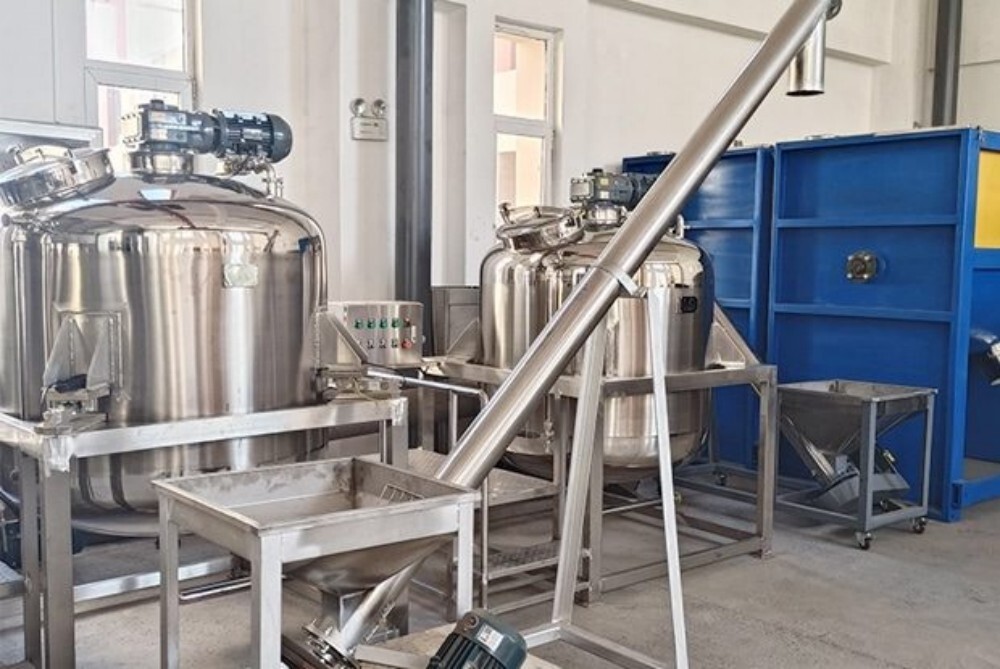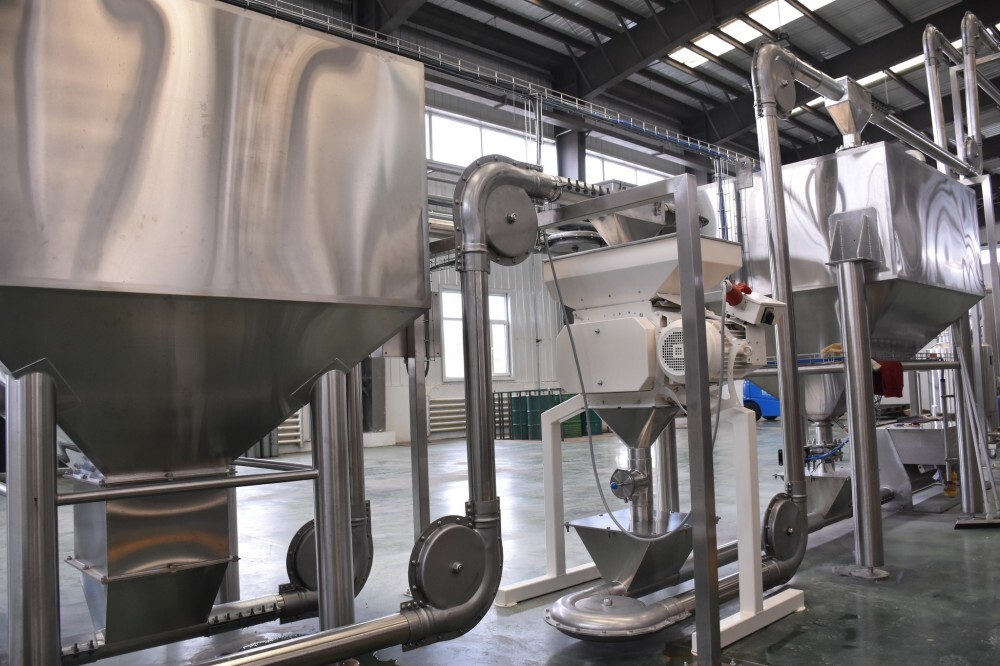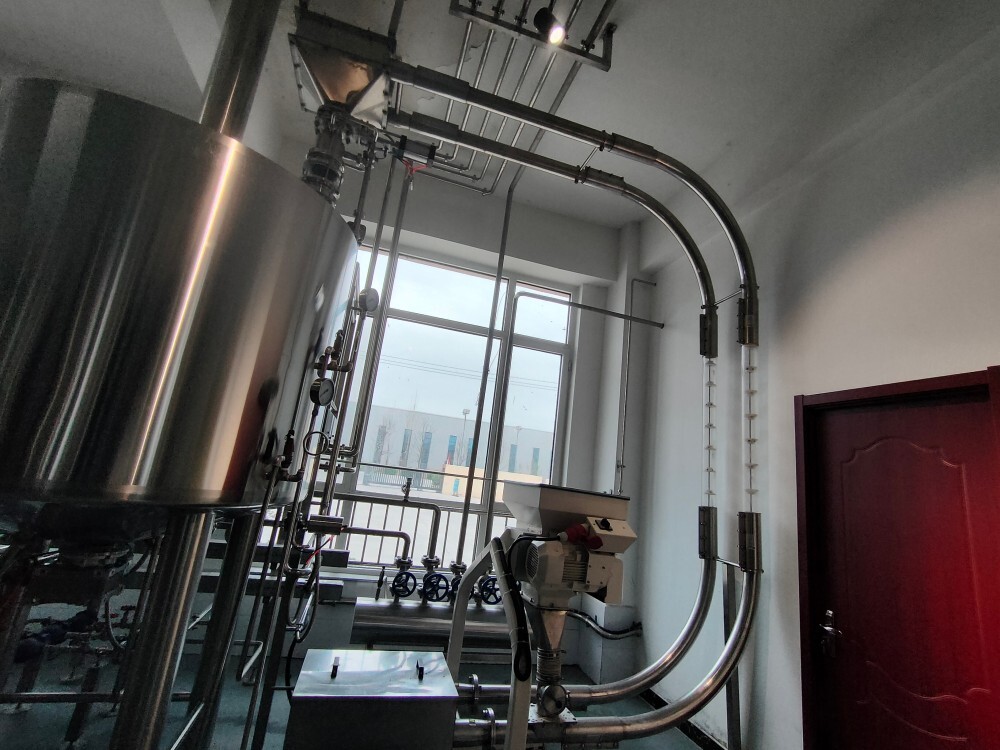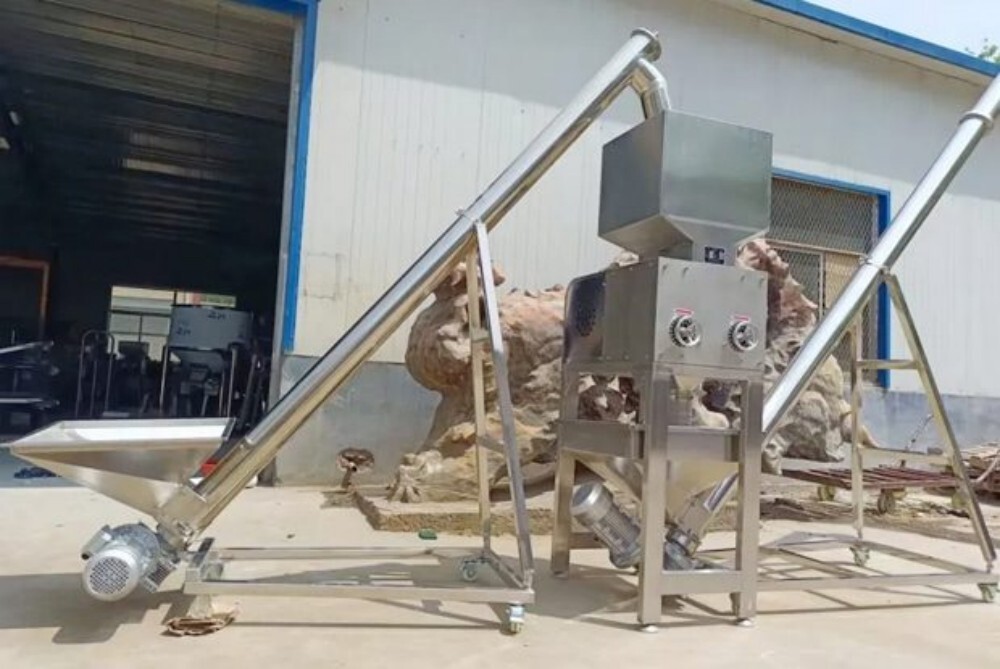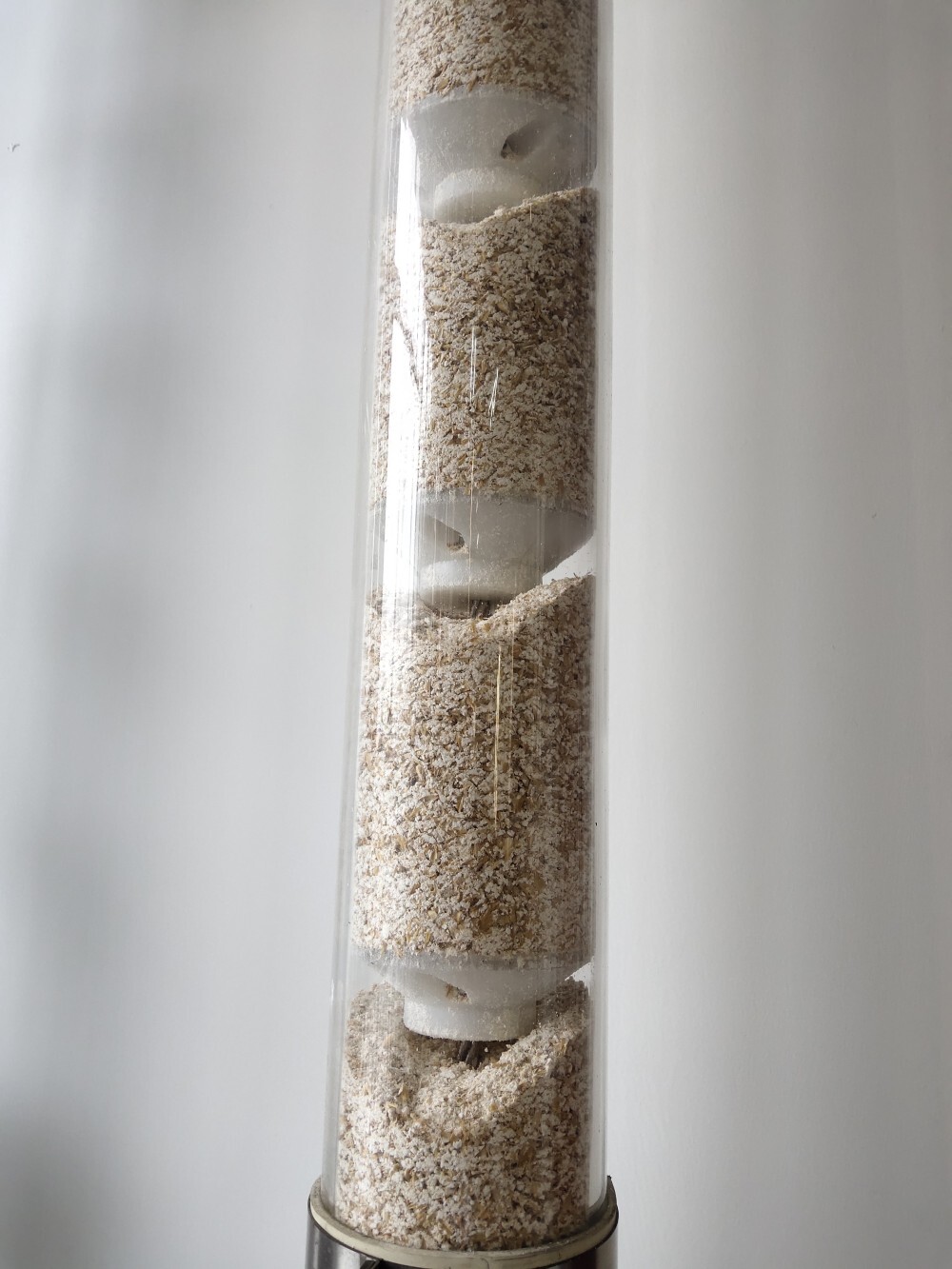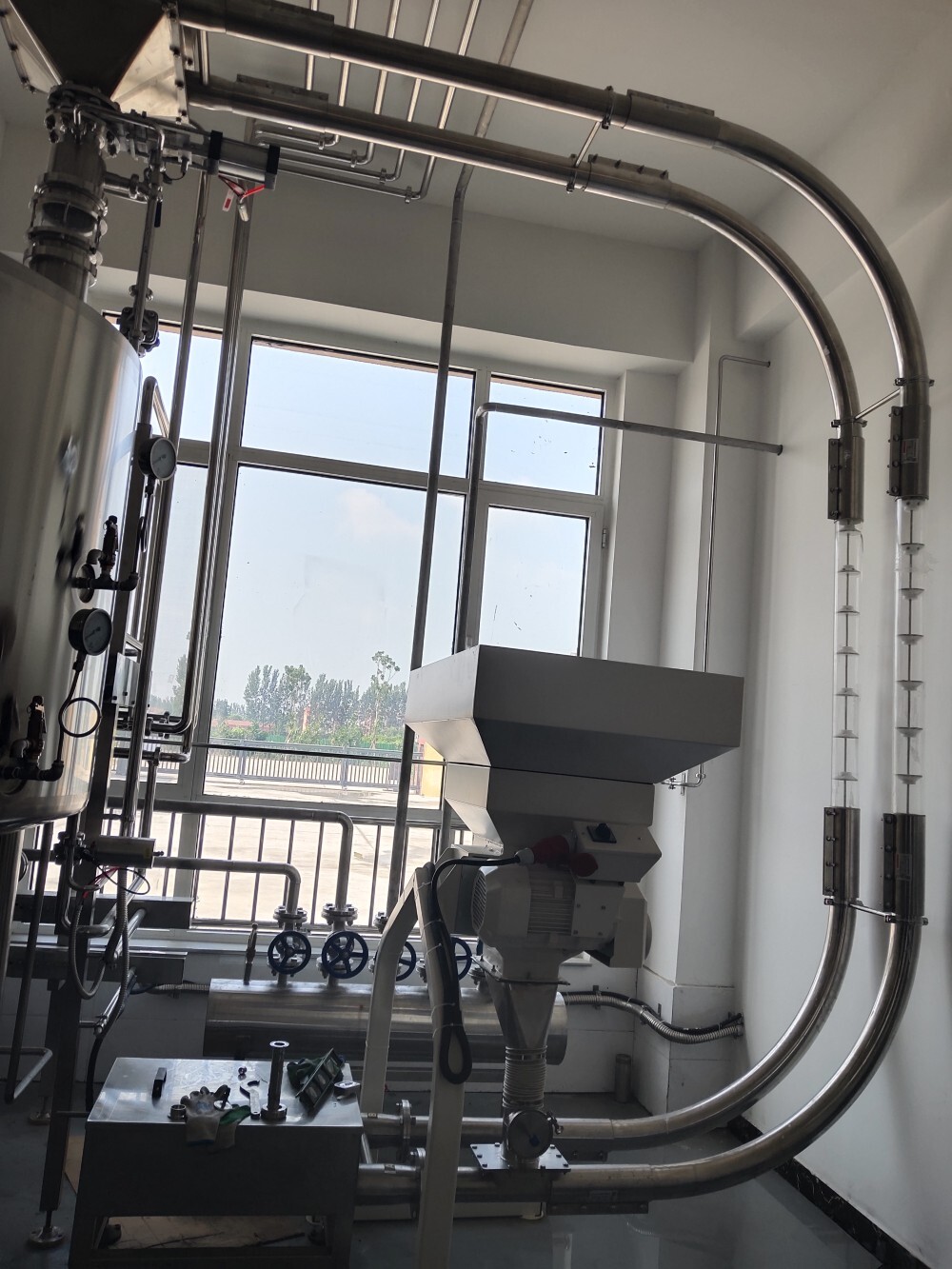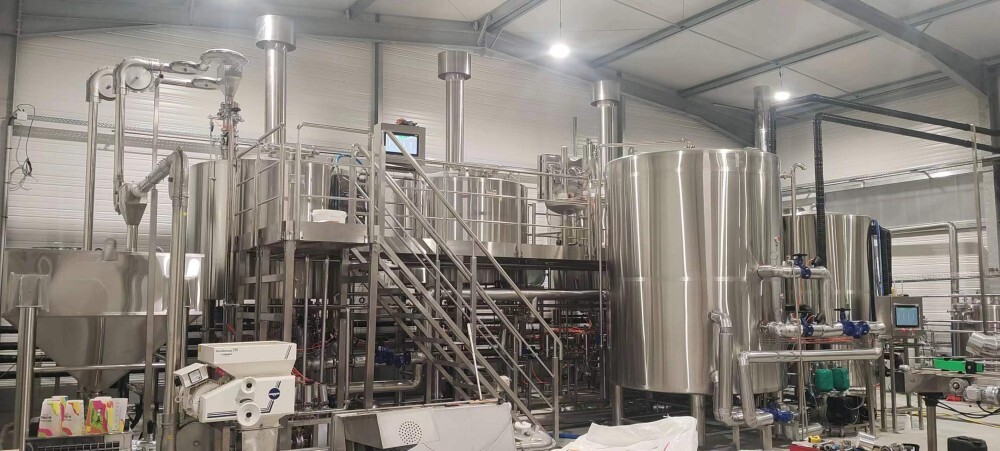OUR Products
Conveyor
Auger conveyor, also known as screw conveyor, is made of steel, which is a kind of machinery that uses a motor to drive the spiral to rotate and move materials to achieve the purpose of conveying. It has the advantages of simple structure, small cross-sectional area, good sealing, easy operation, easy maintenance, convenient closed transportation, etc., But the unit power consumption is large, the conveying distance is short, it is easy to cause the crushing of materials in the conveying process, it is not suitable for conveying pellet feed, and the blades and troughs are worn quickly.
Pipe chain conveyor, also known as tubular drag chain conveyor, when working, the chain equipped with a disc scraper moves in the closed pipeline, relying on the scraper to push the material forward along the pipeline, which is an energy-saving and efficient continuous conveying equipment.It has compact structure, occupies little space, can change the conveying direction in three dimensions, is not affected by terrain, angle and height, the conveying process is carried out in a closed pipeline, the material is pollution-free, no dust flying, the conveying process is smooth, there is basically no internal movement between materials, less damage, to ensure the quality of materials, suitable for abrasive materials, will not produce system blockage, suitable for conveying a variety of forms of materials, the conveying of mixed materials, will not produce material stratification, large conveying capacity, low energy consumption, greatly reduce the operating cost of equipment, All moving parts are operated in a confined space, which is safe and reliable, can realize long-distance transportation, and can be arranged at will with multiple inlet and outlet ports to meet process requirements, easy to achieve centralized control, and improve the degree of automation.
If you need help configuring a system to suit your needs,
we will help you find the right one for you!
The automated conveyor system is a specialized type of automated conveyor system designed to streamline and optimize the material handling and production processes within a brewery. These systems are tailored to the unique needs of the brewing industry and are used to transport raw materials, ingredients, packaging materials, and finished products efficiently and reliably. The automated conveyor system is an essential component in the brewing industry, offering efficiency, consistency, and improved safety. It helps streamline the production process, reduces manual labor, and ensures that the brewing process runs smoothly from ingredient handling to packaging and distribution.
- Our automated conveyor system is your key to maximizing efficiency. By automating the handling and transportation of malt, we’ve streamlined your entire process, reducing labor requirements, and expediting your production. It’s a boost for your bottom line and your brewing output.
- Consistency is non-negotiable. With our system, you can count on a consistent and uniform handling of malt, ensuring that the quality of your ingredients remains unwavering. No room for error, just excellence.
- Our system integrates seamlessly with your existing brewery equipment, from malt mills to storage silos and mashing systems. This synergy optimizes your brewing process, fostering synchronization and efficiency at every step.
- The system ensures consistency and uniformity of malt handling throughout the brewing process, reducing the risk of human error and maintaining the quality of the ingredients.
- The system integrates seamlessly with other brewery equipment, streamlining the brewing process and enabling more synchronized and efficient operations.
- The system helps maintain the quality of malt and other brewing ingredients, minimizes the risk of contamination, and ensures ingredients arrive at the brewing process in their pristine condition.
- The system simplifies the handling and transportation of malt, significantly increasing the overall efficiency of the brewery’s malt handling process, resulting in faster production and reduced labor requirements.
ZYB Craft is a professional manufacturer of yeast systems, we can provide customers with complete turnkey services, including detailed brewery layout and equipment drawings, etc.
Our experienced technical team will serve you at every step, from designing commercial fermentation tank layouts, individual drawings, and manufacturing to installation, commissioning, and on-site training.
No matter the space, time, or budget challenge, we can deliver and install the equipment you need to maximize beer production while maintaining the integrity of your brewing process.
Please contact us for the latest solutions and quotations for the brewery equipment.
Frequently Asked Questions
What Is Brewery Equipment?
The brewery equipment is specialized equipment used in the beer brewing process, typically used in commercial breweries, but also used by home brewers. It can consist of a range of items ranging from basic to complex, all designed to facilitate the brewing process and produce high-quality beer.
The equipment used in breweries can vary in size and complexity depending on the size of the operation. Larger commercial breweries may use automated equipment controlled by computers, while smaller craft breweries may rely on more manual processes. The quality of brewery equipment directly affects the quality of the beer produced, making it a very important aspect of the brewing process.
What Is The Price Of Brewery Equipment?
The price of brewery equipment can vary widely, depending on several factors, such as the size and complexity of the brewing operation, the specific equipment required, and the level of automation required. Costs can range from a few hundred to a few thousand dollars for basic home brewing equipment, to tens or even hundreds of thousands of dollars for small craft breweries.
A large commercial brewery with advanced automation and high-volume production capabilities can cost millions of dollars. If you plan to open a brewery, you can always consult us. Our engineers will provide you with accurate brewery equipment quotes based on your specific needs and budget.
What Material Is The Brewery Equipment Made Of?
Brewery equipment can be manufactured from a variety of materials, depending on the specific parts of the equipment and the intended use of the machine. Some common materials used in brewery equipment include:
- Stainless Steel: This is the most commonly used material in brewery equipment because it is durable, corrosion-resistant, and easy to clean.
- Copper: Copper was used in the past to make brewery equipment due to its good thermal conductivity. However, copper is not commonly used today due to its relatively high cost and its reaction with acidic solutions.
- Aluminum: This lightweight metal is sometimes used in brewery equipment due to its affordability, but it’s not as durable as stainless steel and is more prone to corrosion.
- Plastics: Certain types of plastics, such as polyethylene and polypropylene, are used in some brewery applications due to their low cost and chemical resistance. But they are not as strong as metal, so more frequent replacements may be required.
- Glass: Glass is also used in some specialty brewery containers, such as fermenters for sour beer, but is less common due to its fragility and high cost compared to other materials.
The specific materials used for brewery equipment will depend on the functionality, size, and other requirements of the equipment.
What Does Brewery Equipment Use For Cleaning?
The brewery equipment is often cleaned using specialized cleaners designed to remove organic and inorganic residues without damaging the equipment or leaving any harmful residues. These cleaners are usually alkaline or acidic solutions that are circulated through the brewery equipment along with hot water to break down and remove any buildup from previous batches. Some common cleaning agents used in brewery equipment include:
- Caustic Soda: An alkaline solution used to dissolve organic residues from the brewing process.
- Acid Mix: An acidic solution used to dissolve mineral deposits produced during the brewing process and to sanitize equipment.
- Chlorine-based disinfectant: used to kill bacteria and other microorganisms on the surface of brewery equipment.
- Peracetic Acid (PAA): A disinfectant that is effective against a wide range of microorganisms and does not leave any harmful substances behind.
Which cleaner to use will depend on the type of equipment being cleaned, the type of residue being removed, and any regulations or guidelines that must be followed. It is important to use only approved cleaners and follow proper cleaning procedures to ensure brewery equipment is thoroughly cleaned and safe for subsequent batches.
How Long Can Brewery Equipment Last?
The lifespan of brewery equipment can vary widely based on a number of factors, depending on factors such as equipment quality, maintenance, and frequency of use. Generally speaking, quality stainless steel brewery equipment that is properly cleaned and maintained can last for many years or even decades. However, some components of brewery equipment may need to be replaced, such as rubber gaskets, hoses, and other worn parts.
The brewery equipment is regularly inspected and maintained to ensure it remains in good working order and any damaged or worn parts are replaced as needed. Regular cleaning and maintenance will help extend the life of your equipment and prevent any other problems during your brewing process. Ultimately, the lifespan of brewery equipment is influenced by several factors and varies from equipment to equipment.
How Much Space Is Needed For Brewery Equipment?
The amount of space required for brewery equipment can vary depending on the size and size of the brewing operation, as well as the specific equipment used. Generally speaking, small home brewing facilities only need a few square meters to accommodate, while larger commercial breweries may require hundreds or even thousands of square meters. Some factors that may affect the space required for brewery equipment include:
- Size And Number Of Brewing Containers: Larger containers require more space to accommodate, as do multiple containers.
- Storage Space: Additional storage space for storing raw materials, finished products, and other supplies is also required in a brewery.
- Available Ceiling Height: Some taller brewing equipment, such as fermenters or bright tanks, may require a certain minimum headroom height.
- Auxiliary Facilities: Additional space may be required to accommodate auxiliary facilities, such as packaging lines or laboratory areas.
If you are planning to open a brewery, feel free to contact us. ZYB Craft will provide you with accurate brewery equipment quotations and determine suitable space requirements for you according to your specific needs and budget.
Do You Have Any Question?
Tell us about your brewery equipment requirements!
At ZYB Craft, we’re dedicated to bringing your brewery vision to life. Our expert team of brewers, engineers, and craftspeople is ready to design and manufacture the perfect equipment for your brewing operation. Whether you’re just starting or expanding, we’re here to help. Please leave your specifications, and our team will get in touch to discuss your project in detail. We’ll work closely with you to create equipment that meets your unique needs and budget.
*Rest assured, your information will be kept confidential and used solely for the purpose of assisting you with your brewery equipment needs. We look forward to brewing success together!

